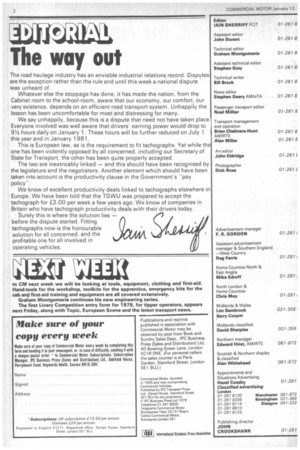The way out
Page 4

If you've noticed an error in this article please click here to report it so we can fix it.
The road haulage industry has an enviable industrial relations record. Disputes are the exception rather than the rule and until this week a national dispute was unheard of.
Whatever else the stoppage has done, it has made the nation, from the Cabinet room to the school-room, aware that our economy, our comfort, our very existence, depends on an efficient road transport system. Unhappily the lesson has been uncomfortable for most and distressing for many. We say unhappily, because this is a dispute that need not have taken place Everyone involved was well aware that drivers' earning power would drop to 91/2 hours daily on January 1. These hours will be further reduced on July 1 this year and in January 1981.
This is European law, as is the requirement to fit tachographs. Yet while the one has been violently opposed by all concerned, including our Secretary of State for Transport, the other has been quite properly accepted. The two are inextricably linked — and this should have been recognised by the legislature and the negotiators. Another element which should have been taken into account is the productivity clause in the Government's -pay policy-.
We know of excellent productivity deals linked to tachographs elsewhere in Europe. We have been told that the TGWU was prepared to accept the tachograph for £3.00 per week a few years ago. We know of companies in Britain who have tachograph productivity deals with their drivers today. Surely this is where the solution lies — before the dispute started. Fitting tachographs now is the honourable solution for all concerned, and the profitable one for all involved in operating vehicles.
































































































































